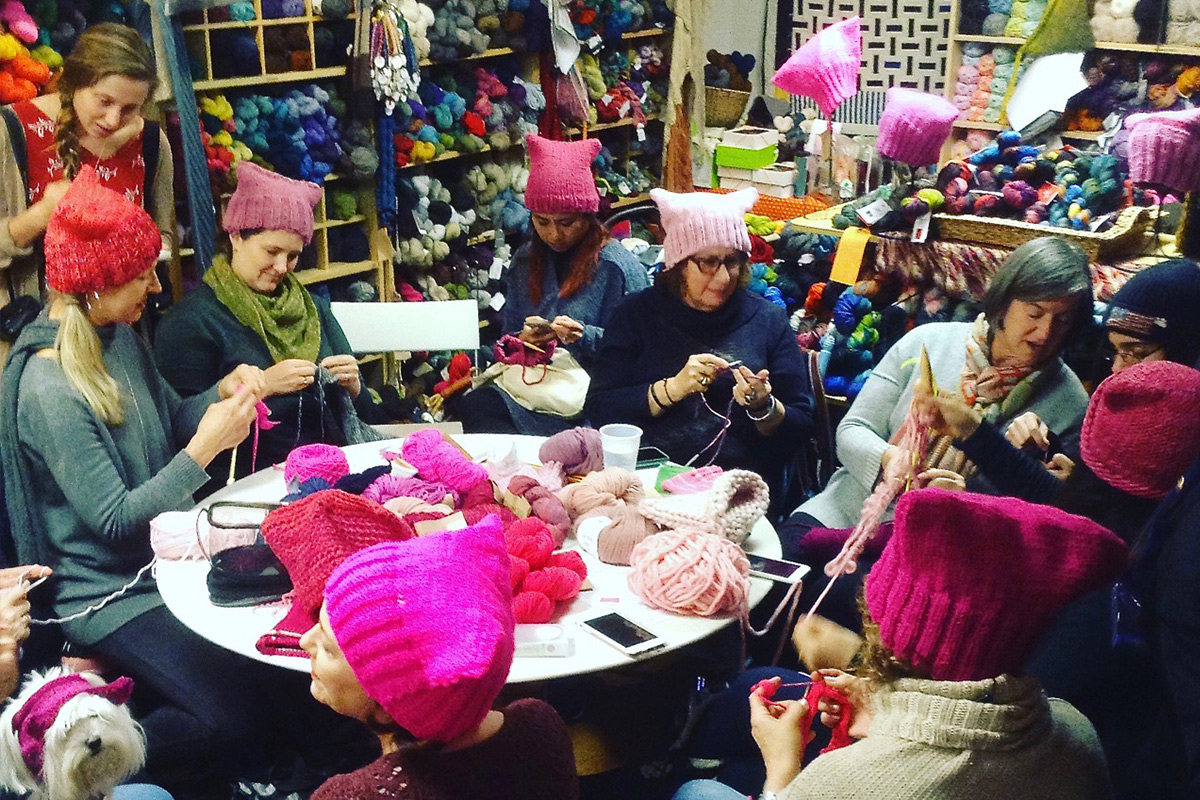By Sandra Markus & Ioana Literat
By now, most of the United States has heard of Ravelry, a previously little-known online crafting community, where members, who are predominantly women, share their knitting projects and expertise. On June 23, 2019, Ravelry announced a new policy banning members from expressing support for Trump or his administration “in the form of forum posts, projects, patterns, profiles, and all other content.” The founders of the privately held site explained that they could no longer provide a safe, inclusive space for their members if they continued to allow pro-Trump expression, as “support of the Trump administration is undeniably support for white supremacy.” The ban was instituted in reaction to racist comments that were provoked by anti-immigration, white supremacist knitting projects (like the “Build the Wall” hat or “Keep America Great” cowl) that had been posted on the site. This controversial stance, even within a relatively unknown site, has brought up greater issues of content moderation on social media sites, particularly around hate speech and extremism. The mainstream media reacted swiftly, with most accounts registering a sense of incredulity and awe that a knitting site would take such a decisive political stand.
If you don’t think of knitting and crafting as political, think again.

Ioana Literat and Sandra Markus
Much of the media’s reaction to Ravelry’s decision reflects the erroneous assumption that Ravelry and the broader knitting community are apolitical. This is not the case, currently or historically. Media reporting and commentary also smack of ageism and gender-based stereotypes of knitters as grey-haired women in rocking chairs – when in fact our research has shown that the crafting community is often in the vanguard of civic activism and political resistance, both offline, in meetups and protests, and online, in affinity spaces like Ravelry.
Media reporting and commentary also smack of ageism and gender-based stereotypes of knitters as grey-haired women in rocking chairs — when in fact our research has shown that the crafting community is often in the vanguard of civic activism and political resistance
As researchers studying online political participation, we’ve followed the Ravelry community for over a year, looking at thousands of forum posts, projects and discussion threads. In particular, our focus was the Pussyhat Project group on Ravelry, the site which is at the epicenter of the current controversy. We found that, for Ravelry members the online community serves two purposes: one as a space to make their political voices heard; and two, as a bridge to political participation and action in their local communities and beyond. Yes, women (young and old) are engaging in politics in the spaces they are comfortable in: what’s so surprising about that?
Our research also put this ban into perspective. From where we sit, indeed, it seemed inevitable.
Since the election of Donald Trump in 2016, the online knitting and crafting community -- once a bastion of friendliness and support -- has been imploding under the weight of political polarization. The election has seen the resurgence of “craftivism” (the use of craft for political expression) in online spaces, most notably illustrated by the Pussyhat Project, an initiative which galvanized hundreds of thousands of women globally into knitting Pussyhats for the Women’s Marches of 2017-2019. The Pussyhat Project, and other craftivist initiatives like it, were organized and activated primarily through online sites like Ravelry. But this political action also made other members feel ostracized. Political schisms on Ravelry – and elsewhere in the crafting community, like on Instagram and YouTube – widened, and incivility, racism, and other forms of toxicity became common.
For the knitting community, this ban is a decisive turning point that has exteriorized the community’s struggles and posed questions that have no easy answers. Its impact will be felt long after the dust settles on the platform itself.
Ravelry’s decision also throws down the gauntlet to other social media sites, urging them to do more than pay lip service to the fight against white nationalism. And much of this pressure is, again, coming from the knitting and crafting community, who are on the forefront of this struggle. Recently, for instance, Instagram has found itself in hot water for disabling accounts of knitters who had spoken up against white nationalism, while choosing to take no action against white nationalist accounts who had been attacking these knitters in the first place.
Ravelry’s decision also throws down the gauntlet to other social media sites, urging them to do more than pay lip service to the fight against white nationalism.
Yes, the enforcement of such policies on a comparatively small social network like Ravelry is much more feasible than, say, on Instagram or Twitter. But this doesn’t make it any less significant. As Tarleton Gillespie wrote in his excellent take on content moderation, “[t]here is an undeniable need, now more than ever, to reconsider the public responsibilities of social media platforms.” Ravelry’s ban puts this impetus front and center, while emphasizing that we have entered an era where to remain politically neutral is no longer viable. The time for handwringing is over. It’s time for other social media platforms to join the fight. The “old ladies” are already there, knitting needles in hand.
Sandra Markus (Ed.D. ’19) is a Professor in the School of Art and Design at the Fashion Institute of Technology, and Researcher Associate in Teachers College’s Center for Technology and School Change. Her research focuses on craft, activism and online communities of practice in art and design. Ioana Literat is Assistant Professor in Teachers College’s program in Communication, Media & Learning Technologies Design. Her research examines creative participation and civic expression in online spaces. Markus and Literat are the authors of ‘Crafting a way forward’: Online participation, craftivism and civic engagement in Ravelry’s Pussyhat Project group, published earlier this year in Information, Communication & Society.
